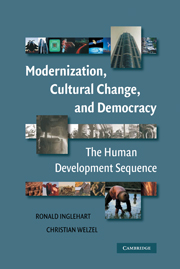Book contents
- Frontmatter
- Contents
- Dedication
- Acknowledgments
- Foreword by Hans-Dieter Klingemann
- Introduction
- PART I THE FORCES SHAPING VALUE CHANGE
- PART II THE CONSEQUENCES OF VALUE CHANGE
- 7 The Causal Link between Democratic Values and Democratic Institutions: Theoretical Discussion
- 8 The Causal Link between Democratic Values and Democratic Institutions: Empirical Analyses
- 9 Social Forces, Collective Action, and International Events
- 10 Individual-Level Values and System-Level Democracy: The Problem of Cross-Level Analysis
- 11 Components of a Prodemocratic Civic Culture
- 12 Gender Equality, Emancipative Values, and Democracy
- 13 The Implications of Human Development
- Conclusion: An Emancipative Theory of Democracy
- Bibliography
- Index
8 - The Causal Link between Democratic Values and Democratic Institutions: Empirical Analyses
Published online by Cambridge University Press: 05 September 2012
- Frontmatter
- Contents
- Dedication
- Acknowledgments
- Foreword by Hans-Dieter Klingemann
- Introduction
- PART I THE FORCES SHAPING VALUE CHANGE
- PART II THE CONSEQUENCES OF VALUE CHANGE
- 7 The Causal Link between Democratic Values and Democratic Institutions: Theoretical Discussion
- 8 The Causal Link between Democratic Values and Democratic Institutions: Empirical Analyses
- 9 Social Forces, Collective Action, and International Events
- 10 Individual-Level Values and System-Level Democracy: The Problem of Cross-Level Analysis
- 11 Components of a Prodemocratic Civic Culture
- 12 Gender Equality, Emancipative Values, and Democracy
- 13 The Implications of Human Development
- Conclusion: An Emancipative Theory of Democracy
- Bibliography
- Index
Summary
Institutional versus Cultural Explanations
The preceding chapter discussed the causal linkage between mass values and democratic institutions from the perspective of a theory of human development. This chapter tests these theoretical expectations empirically, using measures of democratic institutions and mass values from scores of societies. The strong link between mass values and democratic institutions has been explained both institutionally and culturally – and the two interpretations have radically different implications.
The institutional explanation argues that living under democratic institutions causes prodemocratic values to emerge among the public. The cultural explanation reverses the causal arrow, arguing that prodemocratic mass values are conducive to the emergence and survival of democratic institutions. Conceivably, there could be reciprocal effects in the relationship between democratic institutions and democratic mass values, in which case the key question is whether the causal arrow is stronger in one direction than the other. The institutional explanation holds that a society's prior democratic experience has the stronger causal effect on its mass culture. The cultural explanation claims that a society's mass values have the stronger causal effect on its subsequent democratic performance.
The previous chapter outlined some theoretical reasons why the cultural explanation of the relationship between mass values and democracy is more plausible than the institutional explanation. In this chapter we examine a broad base of evidence, using quantitative analyses to test whether the empirical evidence supports the cultural or the institutional explanation.
- Type
- Chapter
- Information
- Modernization, Cultural Change, and DemocracyThe Human Development Sequence, pp. 173 - 209Publisher: Cambridge University PressPrint publication year: 2005



